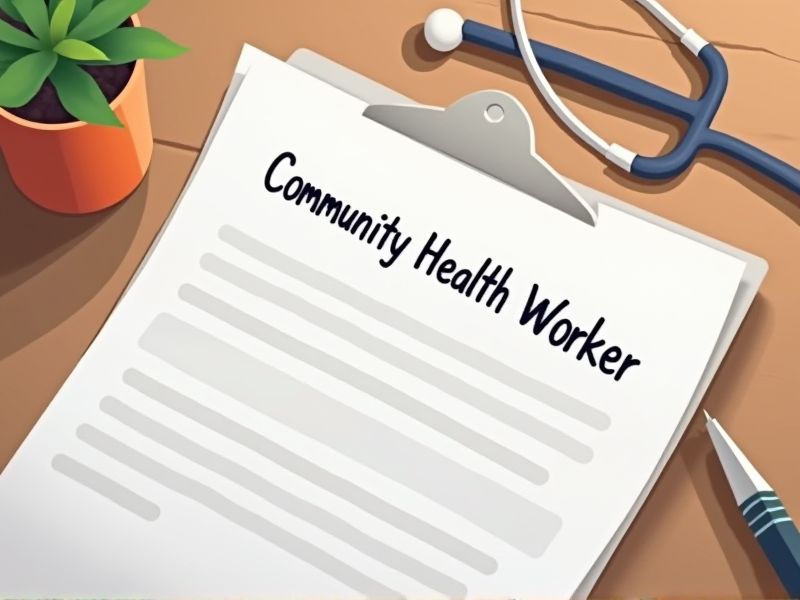
Community Health Workers (CHWs) play a vital role in bridging the gap between communities and healthcare systems, often working with diverse populations that require specific health services. Without certain certifications, CHWs might lack the standardized knowledge essential for delivering effective care and navigating complex healthcare environments. These certifications ensure that CHWs are equipped with the skills to address health disparities and advocate for their communities. Some essential certifications for a Community Health Worker include...
Certified Community Health Worker (CCHW)
Certified Community Health Workers (CCHW) provide a standardized level of care, which improves the overall quality of community health initiatives. Certification ensures that CHWs possess essential skills and knowledge to address specific health disparities effectively. Employers and communities gain confidence in CCHWs' capabilities due to their verified qualifications. Enhanced training through certification can lead to better health outcomes and more efficient use of resources.
National Association of Community Health Workers (NACHW) Certification
The NACHW Certification enhances the credibility of Community Health Workers by providing standardized validation of their skills and knowledge. With certification, community health workers are better equipped to gain employer trust and secure employment opportunities, leading to improved job stability. Certification ensures a consistent level of service across communities, potentially improving health outcomes in underserved populations. The formal recognition of expertise through certification encourages professional growth and continuing education among health workers.
Certified Health Education Specialist (CHES)
A Certified Health Education Specialist (CHES) is needed for Community Health Workers to ensure that educational programs adhere to professional standards and are based on current public health data. CHES professionals bring expertise in evidence-based practice, facilitating effective health promotion and disease prevention strategies. Their certification indicates competency in planning, implementing, and evaluating health education interventions, which enhances program effectiveness. With the growing complexity of health issues, CHES credentials validate the ability to navigate and integrate diverse health information into community practice.
Basic Life Support (BLS) Certification
When Community Health Workers are BLS certified, they can effectively respond to emergencies such as cardiac arrests, significantly improving survival outcomes. Certification also ensures that they can manage situations safely until professional medical help arrives, reducing potential complications. The training enhances their credibility and trustworthiness within the community they serve. Employers and health organizations often require BLS certification to ensure a baseline level of competency in emergency medical response, supporting overall public health strategies.
CPR and First Aid Certification
CPR and First Aid Certification equips community health workers with essential skills to respond effectively during emergency situations. Trained personnel can significantly increase survival rates by providing timely assistance before professional medical help arrives. Certification fosters confidence and credibility, enhancing the trust of the community in health workers. Organizations often require these certifications to ensure that workers meet safety and quality care standards.
Certified Health Literacy Specialist (CHLS)
A Certified Health Literacy Specialist (CHLS) enhances the ability of a Community Health Worker to effectively communicate complex health information to diverse populations. This certification equips CHLS-trained workers with the skills to identify and address barriers to understanding health materials, leading to improved patient outcomes. With a focus on clarity and empathy, CHLS professionals can tailor health messages that are culturally and linguistically appropriate. Community Health Workers with CHLS credentials are better positioned to empower individuals to make informed health decisions, thereby increasing community health literacy levels.
Trauma-Informed Care Certification
Trauma-Informed Care Certification equips Community Health Workers (CHWs) with the skills to recognize and address trauma-related issues, resulting in more effective support for individuals with complex histories. Understanding trauma's impact on behavior and health outcomes enables CHWs to foster safer and more trusting relationships with clients. Certification enhances CHWs' capacity to connect individuals to appropriate mental health resources, improving overall community well-being. Informed practices contribute to reducing re-traumatization and promote a more holistic approach to health care.
Cultural Competency Certification
Cultural competency certification ensures that community health workers effectively understand and navigate diverse cultural backgrounds, fostering trust and communication with clients. This certification reduces health disparities by enabling workers to identify and address cultural barriers to healthcare access. Enhanced cultural competency leads to improved patient outcomes as workers can tailor interventions to meet the cultural needs of diverse populations. Organizations with certified workers often experience greater community engagement and satisfaction, as their services are perceived as more inclusive and respectful.
Public Health Paraprofessional Certification
Community health workers require Public Health Paraprofessional Certification to ensure they meet standardized competencies, increasing their effectiveness in delivering health services. Certification bolsters credibility, fostering trust between workers and the communities they serve. It provides structured training and updated knowledge, equipping workers with the tools needed to address diverse health challenges. The certification process encourages a career pathway, enhancing job satisfaction and promoting professional development in the health sector.
Health Promotion Specialist Certification
Obtaining a Health Promotion Specialist Certification provides Community Health Workers with validated expertise in health education and intervention strategies. The certification enhances their credibility, making it easier to gain the trust of community members and stakeholders. It opens up more job opportunities and potentially leads to higher salaries due to specialized skills. Having this certification aligns the worker with national standards, ensuring consistency and quality in health promotion efforts.
Summary
When you ensure Community Health Workers receive certifications, you increase your knowledge and skills, leading to more effective patient care. This training enhances your confidence, enabling you to communicate health information more clearly and persuasively. By gaining certification, you improve your ability to identify community health needs, resulting in better-targeted health interventions. Certification also boosts your credibility within the community, fostering greater trust and cooperation.
